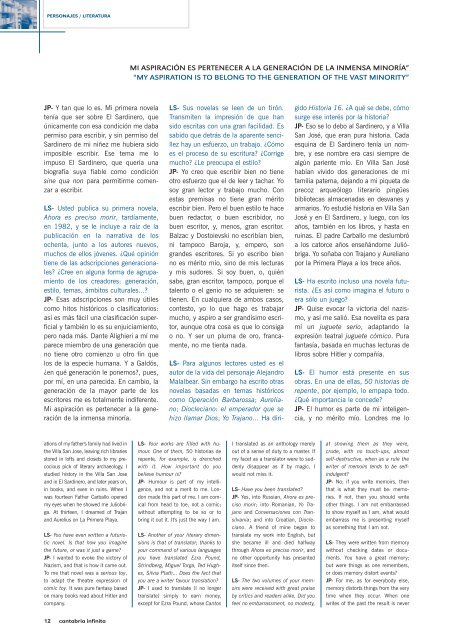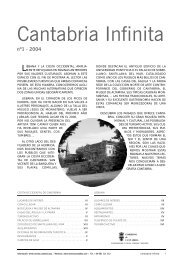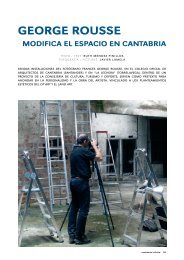Jesús Pardo Jesús Pardo - Cultura de Cantabria
Jesús Pardo Jesús Pardo - Cultura de Cantabria
Jesús Pardo Jesús Pardo - Cultura de Cantabria
You also want an ePaper? Increase the reach of your titles
YUMPU automatically turns print PDFs into web optimized ePapers that Google loves.
PERSONAJES / LITERATURA<br />
JP- Y tan que lo es. Mi primera novela<br />
tenía que ser sobre El Sardinero, que<br />
únicamente con esa condición me daba<br />
permiso para escribir, y sin permiso <strong>de</strong>l<br />
Sardinero <strong>de</strong> mi niñez me hubiera sido<br />
imposible escribir. Ese tema me lo<br />
impuso El Sardinero, que quería una<br />
biografía suya fiable como condición<br />
sine qua non para permitirme comenzar<br />
a escribir.<br />
LS- Usted publica su primera novela,<br />
Ahora es preciso morir, tardíamente,<br />
en 1982, y se le incluye a raíz <strong>de</strong> la<br />
publicación en la narrativa <strong>de</strong> los<br />
ochenta, junto a los autores nuevos,<br />
muchos <strong>de</strong> ellos jóvenes. ¿Qué opinión<br />
tiene <strong>de</strong> las adscripciones generacionales?<br />
¿Cree en alguna forma <strong>de</strong> agrupamiento<br />
<strong>de</strong> los creadores: generación,<br />
estilo, temas, ámbitos culturales...?<br />
JP- Esas adscripciones son muy útiles<br />
como hitos históricos o clasificatorios:<br />
así es más fácil una clasificación superficial<br />
y también lo es su enjuiciamiento,<br />
pero nada más. Dante Alighieri a mí me<br />
parece miembro <strong>de</strong> una generación que<br />
no tiene otro comienzo u otro fin que<br />
los <strong>de</strong> la especie humana. Y a Galdós,<br />
¿en qué generación le ponemos?, pues,<br />
por mí, en una parecida. En cambio, la<br />
generación <strong>de</strong> la mayor parte <strong>de</strong> los<br />
escritores me es totalmente indiferente.<br />
Mi aspiración es pertenecer a la generación<br />
<strong>de</strong> la inmensa minoría.<br />
ations of my father's family had lived in<br />
the Villa San Jose, leaving rich libraries<br />
stored in lofts and closets to my precocious<br />
pick of literary archaeology. I<br />
studied history in the Villa San Jose<br />
and in El Sardinero, and later years on,<br />
in books, and even in ruins. When I<br />
was fourteen Father Carballo opened<br />
my eyes when he showed me Juliobriga.<br />
At thirteen, I dreamed of Trajan<br />
and Aurelius on La Primera Playa.<br />
LS- You have even written a futuristic<br />
novel. Is that how you imagine<br />
the future, or was it just a game?<br />
JP- I wanted to evoke the victory of<br />
Nazism, and that is how it came out.<br />
To me that novel was a serious toy,<br />
to adapt the theatre expression of<br />
comic toy. It was pure fantasy based<br />
on many books read about Hitler and<br />
company.<br />
12 cantabria infinita<br />
MI ASPIRACIÓN ES PERTENECER A LA GENERACIÓN DE LA INMENSA MINORÍA”<br />
“MY ASPIRATION IS TO BELONG TO THE GENERATION OF THE VAST MINORITY”<br />
LS- Sus novelas se leen <strong>de</strong> un tirón.<br />
Transmiten la impresión <strong>de</strong> que han<br />
sido escritas con una gran facilidad. Es<br />
sabido que <strong>de</strong>trás <strong>de</strong> la aparente sencillez<br />
hay un esfuerzo, un trabajo. ¿Cómo<br />
es el proceso <strong>de</strong> su escritura? ¿Corrige<br />
mucho? ¿Le preocupa el estilo?<br />
JP- Yo creo que escribir bien no tiene<br />
otro esfuerzo que el <strong>de</strong> leer y tachar. Yo<br />
soy gran lector y trabajo mucho. Con<br />
estas premisas no tiene gran mérito<br />
escribir bien. Pero el buen estilo te hace<br />
buen redactor, o buen escribidor, no<br />
buen escritor, y, menos, gran escritor.<br />
Balzac y Dostoievski no escribían bien,<br />
ni tampoco Baroja, y, empero, son<br />
gran<strong>de</strong>s escritores. Si yo escribo bien<br />
no es mérito mío, sino <strong>de</strong> mis lecturas<br />
y mis sudores. Si soy buen, o, quién<br />
sabe, gran escritor, tampoco, porque el<br />
talento o el genio no se adquieren: se<br />
tienen. En cualquiera <strong>de</strong> ambos casos,<br />
contesto, yo lo que hago es trabajar<br />
mucho, y aspiro a ser grandísimo escritor,<br />
aunque otra cosa es que lo consiga<br />
o no. Y ser un pluma <strong>de</strong> oro, francamente,<br />
no me tienta nada.<br />
LS- Para algunos lectores usted es el<br />
autor <strong>de</strong> la vida <strong>de</strong>l personaje Alejandro<br />
Malalbear. Sin embargo ha escrito otras<br />
novelas basadas en temas históricos<br />
como Operación Barbarossa; Aureliano;<br />
Diocleciano: el emperador que se<br />
hizo llamar Dios; Yo Trajano... Ha diri-<br />
LS- Your works are filled with humour.<br />
One of them, 50 historias <strong>de</strong><br />
repente, for example, is drenched<br />
with it. How important do you<br />
believe humour is?<br />
JP- Humour is part of my intelligence,<br />
and not a merit to me. London<br />
ma<strong>de</strong> this part of me. I am comical<br />
from head to toe, not a comic;<br />
without attempting to be so or to<br />
bring it out it. It's just the way I am.<br />
LS- Another of your literary dimensions<br />
is that of translator; thanks to<br />
your command of various languages<br />
you have translated Ezra Pound,<br />
Strindberg, Miguel Torga, Ted Hughes,<br />
Silvia Plath... Does the fact that<br />
you are a writer favour translation?<br />
JP- I used to translate (I no longer<br />
translate) simply to earn money,<br />
except for Ezra Pound, whose Cantos<br />
I translated as an anthology merely<br />
out of a sense of duty to a master. If<br />
my facet as a translator were to sud<strong>de</strong>nly<br />
disappear as if by magic, I<br />
would not miss it.<br />
LS- Have you been translated?<br />
JP- Yes, into Russian, Ahora es preciso<br />
morir; into Romanian, Yo Trajano<br />
and Conversaciones con Transilvania;<br />
and into Croatian, Diocleciano.<br />
A friend of mine began to<br />
translate my work into English, but<br />
she became ill and died halfway<br />
through Ahora es preciso morir, and<br />
no other opportunity has presented<br />
itself since then.<br />
LS- The two volumes of your memoirs<br />
were received with great praise<br />
by critics and rea<strong>de</strong>rs alike. Did you<br />
feel no embarrassment, no mo<strong>de</strong>sty,<br />
gido Historia 16. ¿A qué se <strong>de</strong>be, cómo<br />
surge ese interés por la historia?<br />
JP- Eso se lo <strong>de</strong>bo al Sardinero, y a Villa<br />
San José, que eran pura historia. Cada<br />
esquina <strong>de</strong> El Sardinero tenía un nombre,<br />
y ese nombre era casi siempre <strong>de</strong><br />
algún pariente mío. En Villa San José<br />
habían vivido dos generaciones <strong>de</strong> mi<br />
familia paterna, <strong>de</strong>jando a mi piqueta <strong>de</strong><br />
precoz arqueólogo literario pingües<br />
bibliotecas almacenadas en <strong>de</strong>svanes y<br />
armarios. Yo estudié historia en Villa San<br />
José y en El Sardinero, y luego, con los<br />
años, también en los libros, y hasta en<br />
ruinas. El padre Carballo me <strong>de</strong>slumbró<br />
a los catorce años enseñándome Julióbriga.<br />
Yo soñaba con Trajano y Aureliano<br />
por la Primera Playa a los trece años.<br />
LS- Ha escrito incluso una novela futurista.<br />
¿Es así como imagina el futuro o<br />
era sólo un juego?<br />
JP- Quise evocar la victoria <strong>de</strong>l nazismo,<br />
y así me salió. Esa novelita es para<br />
mí un juguete serio, adaptando la<br />
expresión teatral juguete cómico. Pura<br />
fantasía, basada en muchas lecturas <strong>de</strong><br />
libros sobre Hitler y compañía.<br />
LS- El humor está presente en sus<br />
obras. En una <strong>de</strong> ellas, 50 historias <strong>de</strong><br />
repente, por ejemplo, lo empapa todo.<br />
¿Qué importancia le conce<strong>de</strong>?<br />
JP- El humor es parte <strong>de</strong> mi inteligencia,<br />
y no mérito mío. Londres me lo<br />
at showing them as they were,<br />
cru<strong>de</strong>, with no touch-ups, almost<br />
self-<strong>de</strong>structive, when as a rule the<br />
writer of memoirs tends to be selfindulgent?<br />
JP- No; if you write memoirs, then<br />
that is what they must be: memories.<br />
If not, then you should write<br />
other things. I am not embarrassed<br />
to show myself as I am, what would<br />
embarrass me is presenting myself<br />
as something that I am not.<br />
LS- They were written from memory<br />
without checking dates or documents.<br />
You have a great memory;<br />
but were things as one remembers,<br />
or does memory distort events?<br />
JP- For me, as for everybody else,<br />
memory distorts things from the very<br />
time when they occur. When one<br />
writes of the past the result is never




